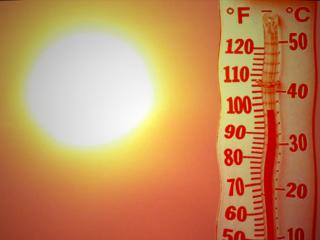It is warming up after a long winter…finally. Amid the desire to be outdoors, and continue working through the heat, it is important that your employees are safe and understand precautions for heat-related illnesses. Management should understand that proper safety precautions need to be in place to prevent heat-related illnesses in the workplace. Statistically, heat related deaths are the number one weather –related killer in the United States. On average, excessive heat claims more lives each year than floods, lightning, tornadoes and hurricanes. When the body heats to quickly to cool itself safely, or when you lose too much fluid or salt through dehydration or sweating, your body temperature rises and heat related illness may develop. As we already know, the costs of workplace injuries can be astronomical. Employee safety is of great importance to us and below we have some great hot weather safety tips for you.
Heat Disorder Symptoms
Sunburn: Redness and pain. In severe cases swelling of skin, blisters, fever, headaches.
- First Aid: Ointments for mild cases if blisters appear and do not break. If breaking occurs, apply dry sterile dressing. Serious, extensive cases should be seen by a physician.
Heat Cramps: Painful spasms usually in the muscles of legs and abdomen with heavy sweating.
- First Aid: Firm pressure on cramping muscles or gentle massage to relieve spasm. Give sips of water. If nausea occurs, discontinue water.
Heat Exhaustion: Heavy sweating, weakness, cold, pale, clammy skin, thready pulse, fainting and vomiting but may have normal temperature.
- First Aid: Get victim out of the sun. Once inside, the person should lie down and loosen his or her clothing. Apply cool, wet cloths. Fan or if possible move the person to an air conditioned room. Offer sips of water. If nausea occurs, discontinue water. If vomiting continues, seek immediate medical attention.
Heat Stroke (or sunstroke): High body temperature (106 Fahrenheit), hot dry skin, rapid and strong pulse, possible unconsciousness.
- First Aid: Heat stroke is a severe medical emergency. Summon emergency medical assistance or get the victim to a hospital immediately. Delay can be fatal. While waiting for emergency assistance, move the victim to a cooler environment; reduce body temperature with a cold bath or sponging. Use extreme caution. Remove clothing, use fans and air conditioners. If the victim temperature rises again, repeat process. Do Not gives fluids. Persons on salt restrictive diets should consult a physician before increasing their salt intake.
Child Safety Tips
- Make sure your child safety seat and safety belt buckles aren’t too hot before securing your child in a safety restraint system, especially when your car has been parked in the heat.
- Never leave your child unattended in a vehicle, even with the windows down.
- Always lock car doors and trunks-even at home-and keep keys out of the reach of children.
- Always make sure all children have the left the car when you reach your destination. Don’t leave sleeping infants in the car ever.
Adult Safety Tips
- Slow down, reduce, eliminate or reschedule strenuous activities until the coolest time of the day. Children, seniors and anyone with health problems should stay in the coolest available place, not necessarily indoors.
- Dress for summer, Wear lightweight, light-colored clothing to reflect heat and sunlight.
- Reduce your food consumption of proteins. Foods, like meat and other proteins increase metabolic heat production increasing water loss.
- Drink plenty of water, non-alcoholic and decaffeinated fluids. Your body needs water to keep cool. Drink plenty of fluids even if you don’t feel thirsty. Persons who have epilepsy or heart, kidney or liver disease, other medical problems and on fluid restrictive diets or have problem with fluid retention should consult a physician before increasing their consumption of fluids. Do not drink alcoholic beverages and limit caffeinated beverages.
- During excessive heat periods, spend more time in air-conditioned places. Air conditioning in homes and other buildings markedly reduces danger from the heat. If you cannot afford an air conditioner, go to the library, store or other location with air conditioning for the hottest part of the day. Don’t get too much sun. Sunburn reduces your body’s ability to dissipate heat
- Do not take salt tablets unless specified by a physician.
The weather always varies by region and location. Factors such as geography, green space, local warning and preventive measures affect how much impact the weather will actually have on health. In any environment, climate has an impact on employee health and wellness. We like to stay on top of employee safety, and provide great safety tips on the NARFA Blog.
Our workers compensation program (the AICC) is one of the best in the US, with a 99% retention rate and huge discounts, dividends paid out to employers every year, and unlimited loss control available to members. Please contact us to learn more about our employee benefits programs including health insurance, wellness rewards, and much more. Our members have been putting our power in numbers to work for them since 1929!
Recent Posts
The U.S. Department of Labor Announces Proposed Rule To Protect Indoor, Outdoor Workers From Extreme Heat
The U.S. Department of Labor has proposed a new rule aimed at protecting workers from extreme heat hazards. This initiative seeks to safeguard approximately 36 [...]
Supreme Court Overturns Chevron Deference: What It Means for Workplace Safety and Regulation
The landscape of federal regulation is set for a seismic shift following a recent Supreme Court decision. On June 28, in Loper Bright Enterprises, et [...]
Navigating the Compliance Maze: How NARFA Simplifies Employee Benefits for Automotive and Trade Industries
In today's complex regulatory environment, businesses in the automotive, roads, fuel, and related industries face unprecedented challenges in managing employee benefits. Recent studies show that [...]




